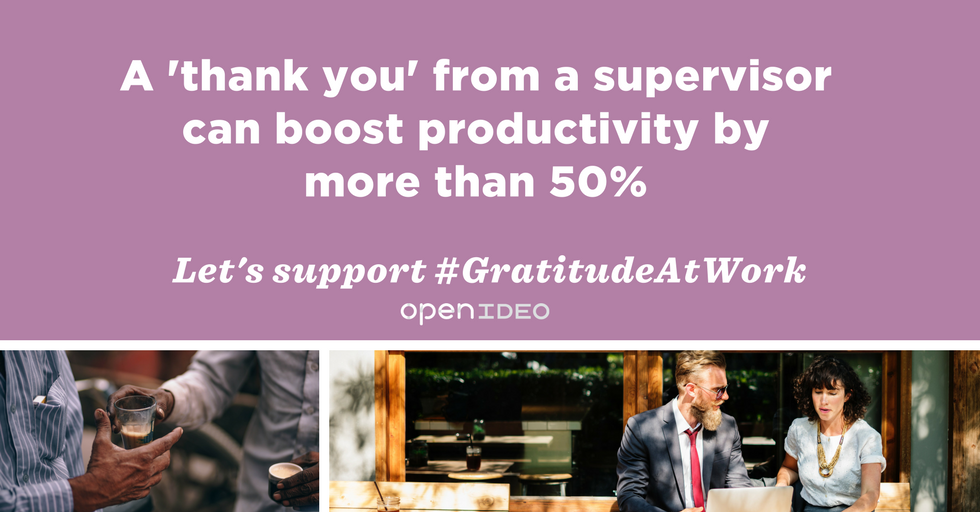OpenIDEO Gratitude in the Workplace Challenge
Over the past two decades, hundreds of studies have documented the social, physical, and psychological benefits of gratitude. Many of these benefits have direct relevance and value to the modern workplace: Evidence suggests that gratitude strengthens our relationships, improves our health, motivates us to achieve our goals, and boosts our feelings of satisfaction with life. More specifically, research has found that:
- 93% of people agree that grateful bosses are more likely to succeed.
- 88% of people say that expressing gratitude to colleagues makes them feel happier and more fulfilled.
- In one study from Harvard University and Wharton, receiving a “thank you” from a supervisor boosted productivity by more than 50%!
 However, research has also found that people are less likely to feel or express gratitude at work than anyplace else: On a given day, only 10 percent of people say “thank you” to colleagues—and 60 percent of people report that they never or very rarely express gratitude at work. According to the U.S. Department of Labor, the number one reason why people leave their jobs is because they don’t feel appreciated.
However, research has also found that people are less likely to feel or express gratitude at work than anyplace else: On a given day, only 10 percent of people say “thank you” to colleagues—and 60 percent of people report that they never or very rarely express gratitude at work. According to the U.S. Department of Labor, the number one reason why people leave their jobs is because they don’t feel appreciated.
That is why the Greater Gratitude Science Center partnered with OpenIDEO to launch an OpenIDEO Challenge on Gratitude in the Workplace. The Challenge aimed to close the “gratitude gap” between what people say they want in the workplace—to feel appreciated and express their own gratitude to colleagues—and what they actually do. It was designed to help identify some of the obstacles to feeling and expressing gratitude at work and to catalyze creative, practical ideas for overcoming these obstacles and inspiring more grateful workplaces. The Challenge generated 348 idea submissions from a wide range of participants: public and private sector organizations, startups, entrepreneurs, designers, students, and many others. After these ideas were refined and carefully reviewed by a panel of judges, the GGSC ultimately awarded $40,000 in implementation grants to these seven Top Ideas that showed the most promise for inspiring experiences and authentic expressions of gratitude in workplaces:
- Leapsome, which allows users to express instant gratitude to anyone within their company by using a digital platform, integrated with email & Slack.
- Vestaboard, a visible board that, when combined with a mobile app or Slack, serves as a dedicated and physical manifestation of expressions of gratitude in a workplace.
- Tribute, a platform that helps employees celebrate their coworkers with a video montage of their peers telling them why they’re awesome.
- DohJe, the first-ever online system for patients and health professionals to share authentic gratitude directly with their caregivers and coworkers.
- Exhibiting Gratitude, a project that uses interactive models, activities, and installations to encourage coworkers to share expressions of gratitude.
- Rider Meets Driver, a mobile app that fosters appreciation and meaningful connections between gig economy drivers and riders by highlighting common interests to inspire genuine conversations.
- Thanks For, an email plugin that allows users to send and receive personal messages of gratitude in an interactive and dynamic manner.
Beyond this funding, the Greater Good Science Center will continue to support these projects with scientific guidance as they get off the ground.
